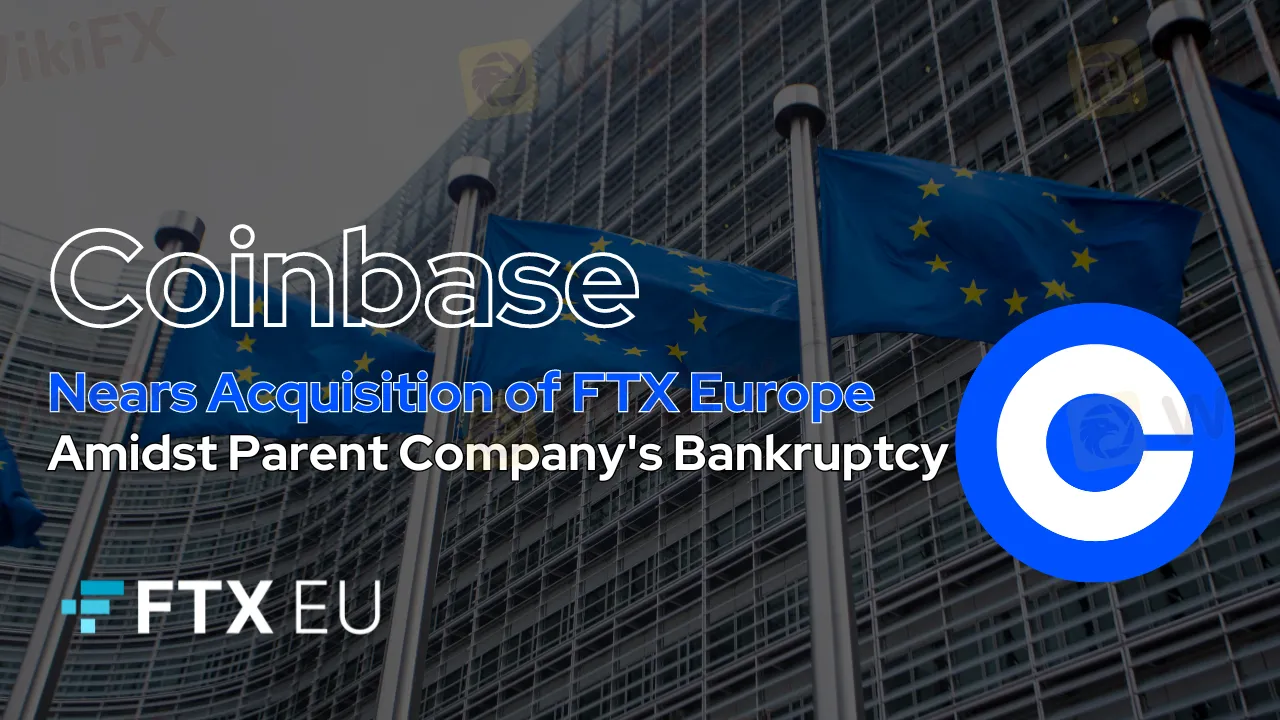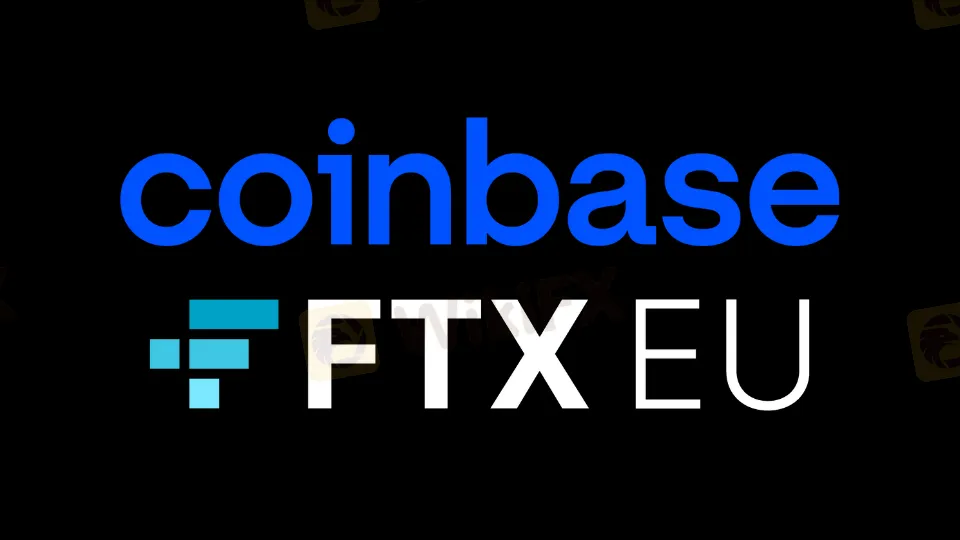简体中文
繁體中文
English
Pусский
日本語
ภาษาไทย
Tiếng Việt
Bahasa Indonesia
Español
हिन्दी
Filippiiniläinen
Français
Deutsch
Português
Türkçe
한국어
العربية
Coinbase Nears Acquisition of FTX Europe Amidst Parent Company's Bankruptcy
Abstract:Coinbase's Bid to Acquire FTX Europe Amid Parent Company's Bankruptcy - A Strategic Move in Cryptocurrency Expansion. Explore the Details of Coinbase's Interest and Regulatory Approval for Cryptocurrency Futures Trading in the U.S.

In a significant move, Coinbase, a prominent player in the cryptocurrency exchange arena, is edging closer to acquiring FTX Europe, a subsidiary of the beleaguered FTX parent company. This potential acquisition is a testament to Coinbase's strategic ambition to expand its presence in regions characterized by well-defined cryptocurrency regulations.
The backdrop of this development is the bankruptcy of FTX's parent company in the United States in 2022. Recent reports suggest that negotiations between Coinbase and FTX Europe have entered their final stages, with renewed discussions taking place in early September.
A key milestone in this process was the approval granted by the U.S.
bankruptcy court to FTX's liquidators. This approval allows them to initiate the sale of four operational subsidiaries, including FTX Europe and its Japanese counterparts. These subsidiaries encompass a custody platform and broker-dealer known as Embed, the crypto derivatives exchange and clearing house LedgerX, FTX Japan, and the center of our focus, FTX Europe. Remarkably, these entities have collectively garnered substantial interest, with up to 117 expressions of interest noted.
While the bankruptcy proceedings could potentially extend over several years, a committee representing FTX's creditors has emphasized the urgency of selling certain assets. They assert that all these businesses maintain healthy balance sheets, operate with independent management structures, and possess valuable franchises. However, there is a perceived risk of diminishing value if they are not expediently sold.

Coinbase's keen interest in acquiring FTX Europe can be attributed to the robust performance of its derivatives business and the consistent growth of its customer base. This strategic shift is particularly noteworthy considering the prevailing decline in spot trading volumes amid the cryptocurrency market's bearish sentiment. Recent data reveals that trading volumes for cryptocurrency financial instruments linked to popular assets like Bitcoin and Ethereum have exceeded spot trade volumes by a substantial factor of six.
What adds further intrigue to Coinbase's move is its recent regulatory approval to introduce federally regulated cryptocurrency futures trading for eligible customers within the United States. By launching these new futures offerings, Coinbase aims to not only enhance its institutional services but also diversify investment options for its clientele.
The significance of this regulatory approval cannot be overstated, as it opens the door for U.S.-based investors to participate in the cryptocurrency derivatives market. Historically, this market segment was largely inaccessible to American investors due to its complexity and elevated risk levels. Crypto derivatives, which constitute over 75% of global crypto trades, enable traders to speculate on price movements without owning the underlying asset, such as Bitcoin.
Beyond this acquisition, Coinbase has emphasized its commitment to expanding its footprint in regions where cryptocurrency regulations are well-defined, with Europe being a prime focus. In a recent blog post, the company highlighted that while much of the world is embracing crypto-friendly regulations, the U.S. seems to be channeling its efforts into enforcing existing rules and introducing new regulations through legal proceedings.
This move by Coinbase underscores its determination to thrive and expand in a dynamic and evolving cryptocurrency landscape. As the negotiations approach their conclusion, the cryptocurrency community eagerly awaits the outcome of this potentially transformative acquisition.
For the latest updates and insights into the cryptocurrency market, stay connected with the WikiFX App on your smartphone. Download the app here: https://www.wikifx.com/en/download.html

Disclaimer:
The views in this article only represent the author's personal views, and do not constitute investment advice on this platform. This platform does not guarantee the accuracy, completeness and timeliness of the information in the article, and will not be liable for any loss caused by the use of or reliance on the information in the article.
Read more

UK Authorities Freeze Nearly $7.7 Million in Illicit Crypto Assets Within a Year
Crypto wallets tied to fraud and tax evasion were frozen under new enforcement powers granted in 2024.

Webull Launches SMSF Investment Platform with Zero Fees
Webull introduces commission-free SMSF trading, offering over 3,500 US and Australian ETFs, with no brokerage fees and enhanced portfolio tools.

Australian Authorities Joins Forces with Philippine Authorities to Combat Cyber Scams
AFP tackles cyber scam boiler rooms in the Philippines, training police to fight fraud and protect Australians from romance and cryptocurrency scams.

Steam Set to Launch Blockchain Game “Paradise” Amid Scam Allegations
“Paradise,” a blockchain-based game accused of being a crypto scam, is set for release on Steam, sparking concerns over platform’s ban enforcement and consumer risks.
WikiFX Broker
Latest News
How Crypto Trading Transforms FX and CFD Brokerage Industry
FCA Warns Against 10 Unlicensed or Clone Firms
CySEC Warns Against 14 Unlicensed Investment Websites
Top Currency Pairs to Watch for Profit This Week - March 31, 2025
Will natural disasters have an impact on the forex market?
Philippines Deports 29 Indonesians Linked to Online Scam Syndicate in Manila
Exposing the Top 5 Scam Brokers of March 2025: A Closer Look by WikiFX
Gold Prices Climb Again – Have Investors Seized the Opportunity?
Webull Launches SMSF Investment Platform with Zero Fees
Australian Regulator Warns of Money Laundering and Fraud Risks in Crypto ATMs
Currency Calculator







